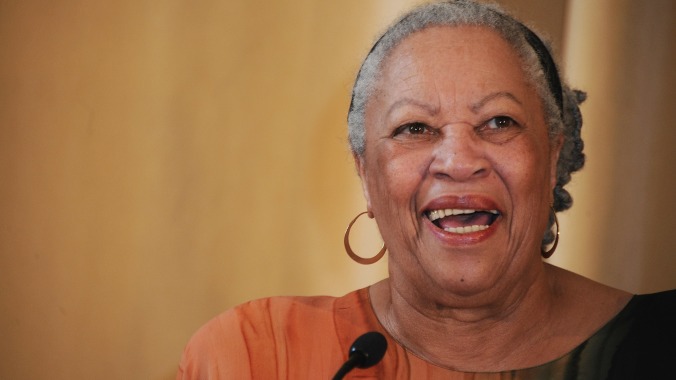R.I.P. Toni Morrison

Toni Morrison, the Pulitzer Prize-winning author, essayist, and educator, has died. Morrison’s family confirmed her death with a statement: “It is with profound sadness we share that, following a short illness, our adored mother and grandmother, Toni Morrison, passed away peacefully last night surrounded by family and friends. She was an extremely devoted mother, grandmother and aunt who reveled in being with her family and friends. The consummate writer who treasured the written word, whether her own, her students or others, she read voraciously and was most at home when writing. Although her passing represents a tremendous loss, we are grateful she had a long, well lived life. While we would like to thank everyone who knew and loved her, personally or through her work, for their support at this difficult time, we ask for privacy as we mourn this loss to our family. We will share information in the near future about how we will celebrate Toni’s incredible life.” She was 88.
Born Chloe Ardelia Wofford in Lorain, Ohio, Morrison developed an early love of storytelling with the help of her parents Ramah and George Wofford, who stoked her interest with African-American folklore and music. At the age of 12 she converted to Catholicism and adopted the baptismal name Anthony, which led to the shortened moniker Toni.
Morrison earned a B.A. in English from Howard University in 1953. While living and attending school in Washington D.C., she experienced segregation for the first time, firsthand. “It was my first time in the south; it was a shock to me. I didn’t know about skin privileges when I grew up in Ohio. We had one high school and so we were all lumped together,” she shared during a talk at the New York Festival in 2015. “When I went to Howard University, when we went to town it was segregated and you had the colored signs on the buses. I… had thought that it was all theater. I thought, Nobody is going to make two sinks, that is so expensive!” Two years later she received her Master of Arts from Cornell University, which segued into a career in teaching English at Texas Southern University. After two years she returned to Howard as an English professor. There, she met architect Harold Morrison, whom she married in 1958 and later divorced in 1964.
As a single mother of two children, she began working as an editor in Random House’s textbook division in 1965. Morrison later transitioned into editing fiction, where she became their first Black female senior editor in their fiction department. With her new position, she would cultivate a new wave of Black writers such as Angela Davis, Gayl Jones, and Toni Cade Bambara. In 1970 Morrison published her first novel, The Bluest Eye, at the age of 39. The work would ultimately connect her with editor Robert Gottlieb at Knopf, who would edit most of her novels. Sula and Song Of Solomon, her second and third novels respectively, would garner national attention, including entry into the Book Of The Month Club and a National Book Critics Circle Award win.
It was Morrison’s Beloved, however, that would catapult her into international renown. Inspired by the true story of enslaved woman Margaret Garner, Beloved told the story of Sethe, a former slave who believes she is haunted by her eldest daughter, who she killed in an effort to avoid a return to slavery. Though Beloved did not secure National Book Award or National Book Critics Award wins —snubs that were protested in The New York Times via a statement from 48 writers and critics, including Maya Angelou —it did win the Pulitzer Prize for fiction, as well as the Anisfield-Wolf Book Award in 1988. Five years later, Morrison would be awarded the Nobel Prize In Literature. Beloved was adapted into a film, which was released in 1998 and starred Oprah Winfrey and Danny Glover. Over the years, would name four of Morrison’s novels as her famed Book Club selections, which would boost Morrison’s sales and further push her into the universal limelight.
In conjunction with her iconic status in the world of literature, Morrison had a very clear voice in politics, using her platform to examine the tense, inequitable climate. In 2012, President Barack Obama presented her with the Medal Of Freedom. He said, “Toni Morrison’s prose brings us that kind of moral and emotional intensity that few writers ever attempt. From Song Of Solomon to Beloved Toni reaches us deeply, using a tone that is lyrical, precise, distinct, and inclusive. She believes that language ‘arcs toward the place where meaning might lie.’ The rest of us are lucky to be following along for the ride.”
Losing Toni Morrison means losing an indelible champion of Black American culture and thought, the sharpest of thinkers, and a purveyor of truth. Iconic and powerful, one of her most benevolent pieces of advice was the idea of using one’s power to help someone find theirs: “I tell my students, ‘When you get these jobs that you have been so brilliantly trained for, just remember that your real job is that if you are free, you need to free somebody else. If you have some power, then your job is to empower somebody else.”